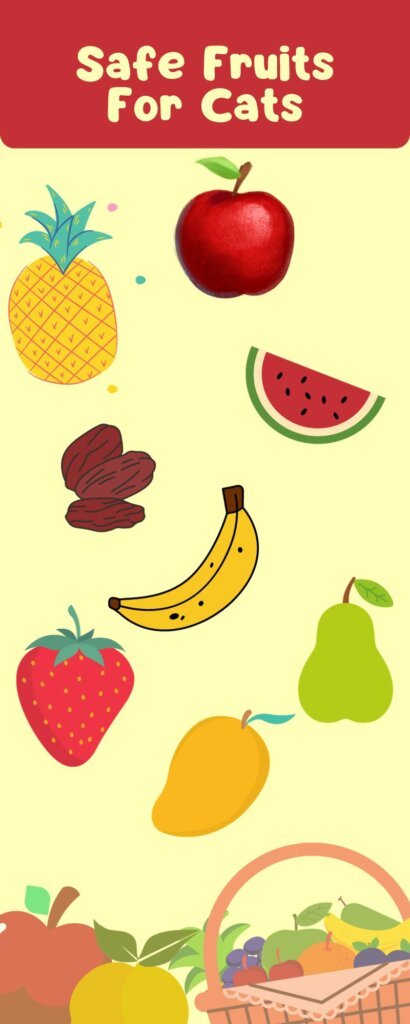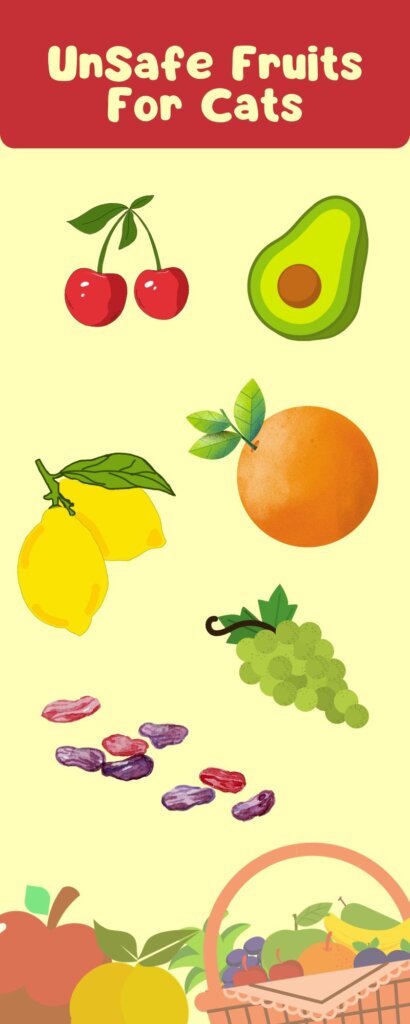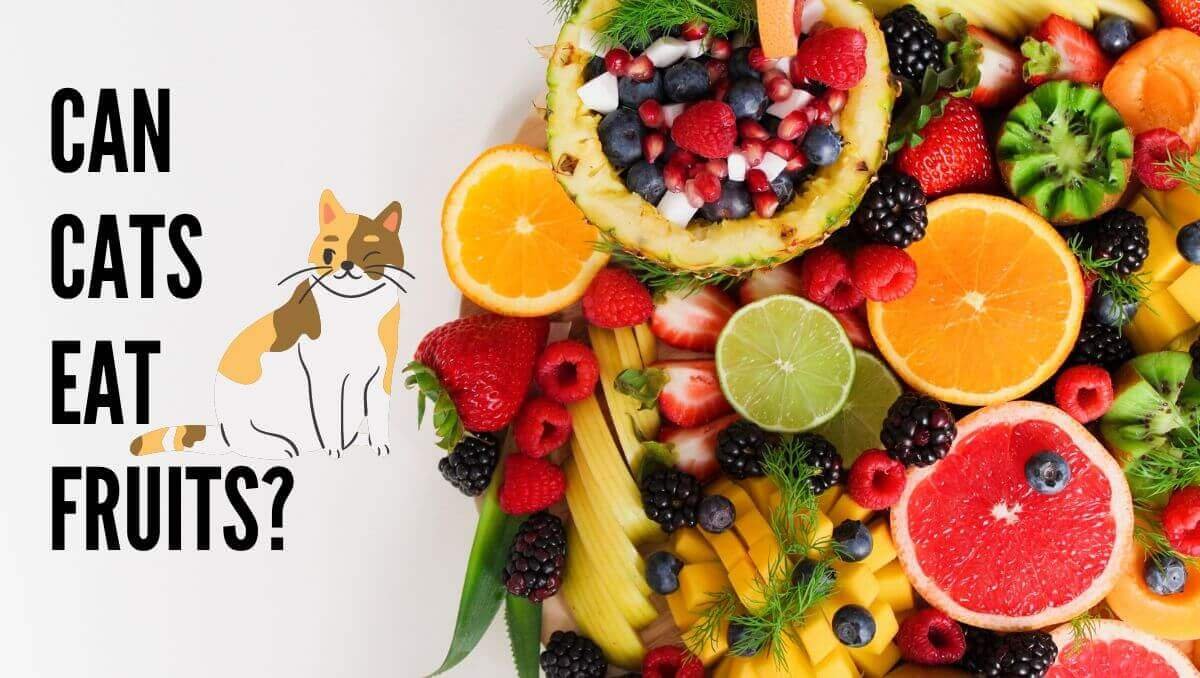Have you ever wondered if you can share fruit snacks with your cats or can cats eat fruits at all? It’s natural to want to spoil your beloved feline companion with tasty human foods. However, what people can digest differs greatly from a cat’s specialized nutritional needs.
In this article, we’ll explore how fruit fits into a cat’s carnivorous diet and discuss can cats eat fruits or not. Read on to learn which fruits may offer nutritional benefits versus those to avoid, plus tips for integrating fruits into your cat’s meals. We’ll cover all you need to know about can cats eat fruits and identify some cat-safe fruit options.
Can Cats Eat Fruits? Examining Cats’ Innate Dietary Needs
To determine if fruits are appropriate for cats, it’s essential to understand feline dietary requirements. Cats are obligate carnivores, meaning they depend almost entirely on animal-based proteins to thrive. Unlike omnivores, a cat’s digestive system is adapted specifically for deriving nutrients from meat-heavy diets.
Cats lack ample carbohydrate-digesting enzymes, having evolved to metabolize protein and fat from prey. They require high levels of protein, vitamins, and fatty acids found in ingredients like meat, organs, and bone. Plant matter comprises only a small fraction of a natural feline diet.
This means fruits are not an integral part of feline nutrition. However, when chosen wisely and fed occasionally, certain fruits may supplement a cat’s diet in moderation.
Are Fruits Beneficial Additions for Cats?
Did you know that even though cats are obligate carnivores, they can still benefit from certain fruits in moderation? Yup, you heard that right! Some fruits are packed with antioxidants, vitamins, minerals, and phytochemicals that can help boost your feline friend’s health and immunity. So, don’t be afraid to share a few bites of your favorite fruits with your furry companion
Fruits also add palatable flavor and texture variety, which may pique finicky eaters. Some cats enjoy fruit as an occasional treat. However, meat and animal products must remain the consistent foundation of their diets.
Fruits lack the complete protein and fat cats require. Excessive quantities can upset digestion. But the right fruits judiciously fed in tiny portions can complement a cat’s nutrition. Work with your veterinarian when first introducing fruits.
Safe Fruits for Cat

While not a natural part of their diet, some fruits can be healthy occasional treats for cats. Certain fruits provide beneficial nutrients and antioxidants that may complement your cat’s regular carnivorous diet when fed responsibly. Let’s discuss some cat-safe fruits that, in moderation, can add flavor and supplemental nutrition for your feline friend
Blueberries
This antioxidant-rich berry is packed with manganese and vitamins C and K. The small serving size prevents overconsumption. Blueberries make an easy addition thanks to their petite size and appealing flavor for many cats. Start with just one or two berries at a time.
Bananas
Bananas contain potassium, magnesium, and vitamin C. Select very ripe bananas and only offer a fork-tipped amount. Extremely ripe bananas are easier for cats to digest due to higher natural sugar content. Mash a tiny banana tip well before mixing into food.
Cantaloupe
This hydrating melon provides beta-carotene, vitamin A and C. It makes a refreshing treat. The high water content helps keep cats hydrated on warm days. Scoop out a teaspoon of cantaloupe flesh from the rind before serving.
Apples
Remove stems and seeds first. The flesh offers quercetin, vitamin C and fiber. Use sweet apple varieties and core before slicing off thin wedges. Cook or microwave apples to soften them before feeding cats.
Strawberries
In limited amounts, these berries provide vitamin C and fiber. Introduce gradually. Select ripe, fresh berries and remove the green tops before offering cats a small portion. Mash thoroughly before mixing into food.
Watermelon
The high water content in watermelon keeps cats hydrated. Feed occasionally. Pick young, ripe watermelons which are easier to digest than older melons. Remove rinds before serving, as they may cause stomach upset.
Pineapple
Pineapple contains vitamin C, thiamine, and manganese. Choose ripe, fresh pineapple and remove prickly outer skin first. Chop a small wedge into bite-sized pieces before lightly cooking to soften. Introduce pineapple gradually mixed into food.
Mangoes
Mangoes provide vitamins A, B6, and C. Peel and pit ripe mangoes, then finely chop a tablespoon portion. The flesh can be mashed or pureed for easier digestion and mixed with wet food.
Raspberries
These antioxidant-rich berries supply vitamin C and fiber. Select fresh, ripe raspberries and gently mash a couple before mixing into food. Introduce raspberries slowly in tiny portions weekly.
Dates
Dates contain antioxidants, potassium, magnesium, and fiber. Pit and finely chop fresh, ripe dates before mashing them into a paste. Introduce date paste gradually by mixing just a teaspoon into your cat’s food to provide supplemental nutrients. Monitor stool consistency when feeding dates.
When introducing fruits, begin with tiny piece-sized portions served two to three times weekly at most. Monitor stool consistency and litter box habits. If any signs of digestive upset occur, discontinue fruit immediately.
Fruits to Avoid for Cat Health

While some fruits are safe for cats, there are also many fruits that should be completely avoided. Certain fruits contain toxins or compounds that can cause illness in cats due to their unique digestive systems. In this section, we will discuss which fruits present risks for cats and are unsafe to offer feline companions.
Grapes or Raisins
Contain unknown toxins harmful to cats’ kidneys. Even small amounts may lead to potentially fatal kidney damage over time. Promptly contact your vet if you suspect your cat has ingested any grapes or raisins.
Citrus Fruits
Fruits like limes, lemons, oranges and grapefruit are too acidic for cats. The citric acid may induce vomiting or central nervous system depression if consumed. Never share citrus fruits with cats.
Cherries
Both the flesh and pits contain substances like cyanide that are poisonous to cats. Chewing the pit risks deadly cyanide poisoning. Avoid allowing access to any cherries.
Avocados
The leaves, pit, skin and fat content of avocados can be toxic. These fatty fruits may potentially damage cats’ hearts, lungs and tissue if ingested. Do not feed avocado in any form.
Dried Fruits
Their smaller shriveled size and stickier chewy texture easily present a choking risk for cats. Even modest amounts could block airways. Keep all dried fruits safely out of paw’s reach.
If you suspect your cat consumed any unsafe fruits, call your veterinarian or an emergency vet clinic immediately. Treatment within hours can greatly improve prognosis.
Exploring Other Food Options for Cats
There are some other people foods that can complement your cat’s carnivorous diet in moderation. Certain cooked meats, like plain chicken, turkey, or lean beef offer excellent protein sources for cats. Some veggies like carrots and green beans also supply key vitamins and minerals when cooked thoroughly and served in small amounts.
Plain, unsweetened yogurt contains probiotics that may aid digestion, but dairy should be limited. Foods like cheese and ice cream are too high in lactose and fat for cats.
While many nuts are too high in fat, a couple almonds or walnuts now and then may be tolerated. Eggs also present a good protein boost when cooked plain. Low-mercury fish like salmon and tuna provide healthy oils in moderation.
Just as with fruits, introducing any new foods slowly while watching for allergic reactions or upset stomach is key. Alternatively, here are list of safe options including vegetables and others foods for cats to safely consume.
Consult Your Vet for Tailored Fruit Guidance
While fruits may add interest to feline diets, always consult your veterinarian before introducing new foods. They can help identify any potential allergies or intolerances your individual cat may have. Older cats with kidney disease may tolerate only low-sugar fruits, for example.
When given in small amounts as occasional treats, some fruits can add variety and supplemental nutrition to your cat’s diet when approved by your vet. But it’s important to remember that meat and animal-based oils should still be the main focus of what cats eat.
Fruits can be a nice complement along with their regular food, but don’t have all the proteins and nutrients carnivores like cats depend on. Since cats are naturally meat-eaters, they thrive best on a meat-centered diet.
Conclusion
Cats’ biological makeup drives a need for meat-based nutrition. While humans associate fruits with health, feline digestive systems are not designed to thrive on plant-based foods. However, when fed responsibly and in moderation, fruits may supplement cats’ diets with key vitamins, minerals and antioxidants.
Consult your veterinarian to determine safe fruits and proper portions for your cat. With informed fruit integration, cats can benefit from fruits’ positive attributes while adhering to their carnivorous requirements.
